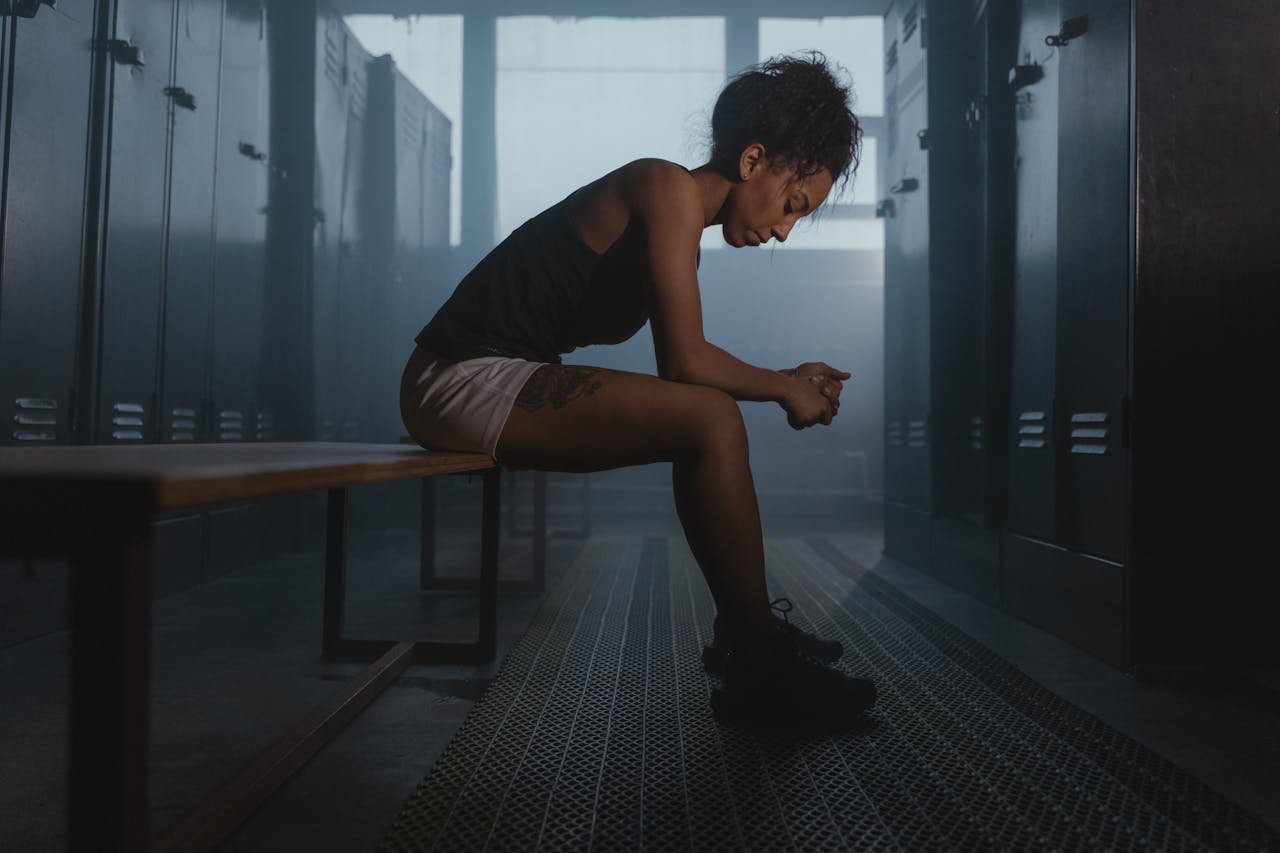Contents
- What Is Gym Anxiety?
- Common Causes of Gym Anxiety
- How Gym Anxiety Can Affect Progress
- How to Push Through Gym Anxiety: Step-by-Step Strategies
- 1. Create a Pre-Workout Plan
- 2. Visit the Gym at Off-Peak Hours
- 3. Start with Machines or Bodyweight Workouts
- 4. Wear Clothes That Make You Feel Good
- 5. Listen to Music or Podcasts
- 6. Avoid Comparing Yourself to Others
- 7. Ask for Help (or Hire a Coach)
- 8. Use Positive Self-Talk and Visualization
- 9. Bring a Friend
- 10. Track Your Wins
- When to Seek Professional Support
- Conclusion
Starting or returning to the gym can feel intimidating—especially when you’re new to the environment, uncertain about equipment, or concerned about being judged. This emotional barrier is often called gym anxiety, and it affects beginners and experienced lifters alike.
But here’s the good news: with the right mindset shifts, tools, and support, you can transform anxiety into empowerment and build a sustainable, confident relationship with exercise.
This article explores why gym anxiety happens, how it affects behavior, and practical strategies to overcome it, so you can walk into any gym with purpose, not pressure.
What Is Gym Anxiety?
Gym anxiety, or “gymtimidation” is a form of situational social anxiety that arises in fitness settings. It may involve:
- Fear of being judged by others for appearance, ability, or form
- Uncertainty about how to use equipment or navigate the space
- Performance pressure or fear of doing exercises incorrectly
- Comparisons to more experienced gym-goers
A 2020 study in Psychology of Sport and Exercise found that gym anxiety can lead to avoidance behavior, decreased exercise frequency, and reduced self-efficacy in fitness settings (Asmundson & Taylor, 2020).
Common Causes of Gym Anxiety
- Lack of familiarity with equipment or gym layout
- Negative body image or self-consciousness
- Overwhelming crowds or loud environments
- Fear of embarrassment or “doing it wrong”
- Comparison to others’ fitness levels or physiques
- Previous negative gym experiences
How Gym Anxiety Can Affect Progress
- Inconsistent attendance due to emotional avoidance
- Reduced workout intensity from fear of judgment
- Skipping strength training (especially free weights) due to equipment intimidation
- Quitting entirely before seeing progress
That’s why addressing gym anxiety is not just about comfort—it’s about consistency and success.
How to Push Through Gym Anxiety: Step-by-Step Strategies
1. Create a Pre-Workout Plan
Having a written or app-based workout plan provides structure and purpose. You’ll spend less time wandering and more time training with intention.
Pro Tip: Use our illustrated exercise database to learn what to do and how to do it. Get instructions on how to perform each exercise and design your own routine with our free workout planner.
2. Visit the Gym at Off-Peak Hours
Gyms are usually less crowded:
- Weekdays: 9–11 a.m. or 1–4 p.m.
- Weekends: early morning or late afternoon
This reduces pressure, noise, and the chance of having to wait for equipment.
3. Start with Machines or Bodyweight Workouts
You don’t have to start with barbells or free weights. Use:
- Resistance machines
- Cardio equipment
- Bodyweight circuits
These offer safe, beginner-friendly movement patterns that help you build competence and confidence.
4. Wear Clothes That Make You Feel Good
Wear gym gear that feels comfortable, supportive, and aligns with your style. If you feel good in your clothes, you’re more likely to feel good about moving in them.
5. Listen to Music or Podcasts
Bringing headphones allows you to create a personal “bubble” that blocks out distractions and boosts motivation. Choose music that energizes you—or calming audio if nerves are high.
6. Avoid Comparing Yourself to Others
Remind yourself:
- Everyone started somewhere
- Most people are focused on their own workout
- Progress isn’t linear—and it’s OK to be a beginner
Your journey is yours alone.
7. Ask for Help (or Hire a Coach)
Many gyms offer:
- Free intro sessions
- Staff walkthroughs
- Personal trainers
Working with a certified coach—even short-term—can build your skills and confidence faster than going it alone.
8. Use Positive Self-Talk and Visualization
Before walking in, try:
- “I belong here. I’m allowed to take up space.”
- Visualize yourself successfully completing the workout
- Breathe deeply to calm your nervous system
These mental shifts reinforce self-efficacy—your belief in your ability to succeed.
9. Bring a Friend
A workout partner can reduce anxiety through shared experience, accountability, and a sense of safety. It also adds a social element that makes the gym feel less intimidating.
10. Track Your Wins
Keep a training log or notes app to track:
- Days attended
- Exercises completed
- Progress made (e.g., heavier weights, longer sessions)
Seeing your growth builds confidence and motivation.
When to Seek Professional Support
If your gym anxiety becomes overwhelming or causes panic attacks, avoidance, or emotional distress, it may be linked to broader anxiety or body image issues. In this case:
- Speak with a therapist or mental health professional
- Consider CBT (cognitive behavioral therapy), which is proven effective for social anxiety
- Use fitness as a supportive—not triggering—tool in your mental health plan
Conclusion
Gym anxiety is real—but it’s also conquerable. With the right approach, mindset, and support, you can learn to navigate the gym environment with confidence, build positive momentum, and reclaim the joy of movement.
You don’t have to be fearless to show up. You just have to keep showing up despite the fear—and eventually, it fades.
References
- Asmundson GJ, Taylor S. Social anxiety and exercise: A review of the evidence and practical recommendations. Psychol Sport Exerc. 2020;47:101520.
- Petruzzello SJ, et al. A meta-analysis on the anxiety-reducing effects of acute and chronic exercise. Sports Med. 1991;11(3):143–182. https://doi.org/10.2165/00007256-199111030-00002
- Dishman RK, O’Connor PJ. Lessons in exercise neurobiology: The case of endorphins. Ment Health Phys Act. 2009;2(1):4–9. https://doi.org/10.1016/j.mhpa.2009.01.002
- American Psychological Association. Anxiety and exercise. https://www.apa.org/news/press/releases/stress/2013/exercise



